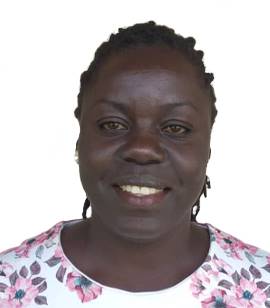
Mr. Abele Emmanuel Moro

Mr. Benard Awich

Ms. Mirriam Lamwaka Okot
Background: Caritas is a Latin word meaning charity or love for the poor. Caritas Arua Diocese started in 1986 as a relief office after the return of refugees from Congo and Sudan. By that time Caritas’ main services were to give out food and tents but due to increased demand for food, Social Services Development (SSD) now Caritas turned its services into provision of farm tools and agricultural inputs. By 1994 SSD became a fully-fledged office of its own. Caritas is the Social Services and Development arm of Arua Diocese entrusted with the socio-economic ministry of the Catholic Church (i.e. Integral Human Development) in this Diocese. It is the instrument and expression of charity in the Christian community. The organization is meant to give heart to the Church’s socio–pastoral action, directed by the Bishop. The activities of Caritas Arua are based on the social teaching of the Catholic Church. Caritas Arua Diocese is a member of Caritas Uganda that is also part of the Roman Catholic Caritas International network
Have life in its fullness” (Jn 10:10) Build charitable and more just world where everybody can live in peace and enjoy full human dignity.
To bare witnesses to God’s love. To work and share the vision of spreading charity, peace, social justice and integral development, thus translating the Christian message of love of neighbor, compassion and solidarity in the contemporary actions for the sake of the poor and needy in our society.
Caritas Arua Diocese upholds values that are enshrined in Christian Doctrines in the delivery of programmes and projects, specifically; the following values are promoted.
1. Love: inspiring all to do both the corporal and spiritual works of mercy (Matt: 25.35)
2. Truth: enhancing the conformity of the intellect and spreading a simple message of love and peace.
3. Justice: ensuring the fair, moral, and impartial treatment of all persons
4. Freedom:ensuring a state of being free or at liberty rather than in confinement or under physical restraint or exemption from external control, interference, regulation, etc.
5. Transparency & Accountability:Accountability means that all officers and members are responsible for their acts in the organization and Transparency means that all transactions in the organization must be open for inspection by all members.
6. Equity:the state or quality of being just and fair.
7. Professionalism (Integrity, commitment and Respect:the methods, character, status, etc., of a professional or the pursuit of an activity for gain or livelihood
8. Solidarity:union or fellowship arising from common responsibilities and interests, as between members of a group or between classes, peoples, etc., to promote solidarity among union members or community of feelings, purposes, etc. or community of responsibilities and interests.
9. Subsidiarity:(in the Roman Catholic Church) a principle of social doctrine that all social bodies exist for the sake of the individual so that what individuals are able to do, society should not take over, and what small societies can do, larger societies should not take over and/ or (in political systems) the principle of devolving decisions to the lowest practical level
Since Uganda is a member to the United Nations, Caritas Arua has also focused its plans and activities on the following Millennium Development Goals (MDG);
1. Eradication of extreme poverty and hunger
2. Promote gender equality and empowerment of women
3. Combat HIV/ AIDS, malaria and other diseases
4. Improve maternal health
5. Reduce child mortality
6. Achieve Universal Primary Education
7. Achieve Universal Primary Education
8. Develop a global partnership for development
What We Do:
1. Democracy and Good Governance
a. Civic Education (Voter education and electoral Democracy)
b. Research and Advocacy for improved service delivery
2. Food Security and Livelihood Development
a. Micro Finance development through Village Savings and Loans associations (VSLA)
3. HIV/ AIDS
a. Awareness creation
b. HIV Counseling and Testing
c. Prevention of Mother To Child Transmission (PMTCT) of HIV/ AIDS infections
4. Environmental protection and management
a. Aforestation
b. Promotion of Energy Savings Stoves.
c. Water, Hygiene and Sanitation
d. Environmental education
5. Gender and Development
a. Empowerment of Special Interest Groups (SIGs) including; women, children and youth, PWDs, PLHAs, Widowed, etc.
6. Institutional Capacity Development
a. Staff Development
b. Board and Institutional Policy development.
7. Relief aid in emergencies;
a. in cases of situations like drought, floods, physical displacements (refugees)
By its governance structure, Caritas Arua Diocese is headed by the Bishop under whom is the Caritas Board. The secretariat is headed by a Director appointed by the Bishop, who works with and oversees both the technical and support staff. Caritas Arua’s structure goes down to parish, chapel, Small Christian communities up to household level or the Christian family levels.
Caritas Arua Diocese,
P.O. Box 135,
Arua-City, Uganda.
Tel: +256 773 799 740
Email: info@caritasaruadiocese.org
Email: caritasarua@yahoo.com
Email: caritas@dioceseofarua.org
Website: www.caritasaruadiocese.org